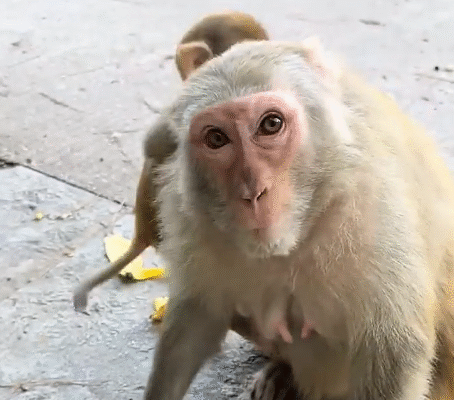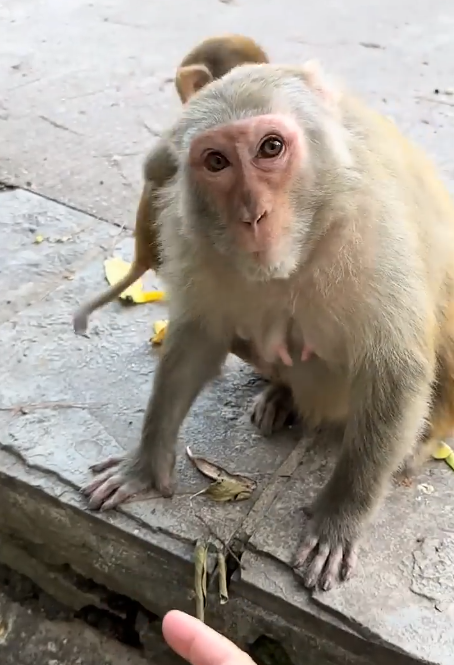
Every village has its stories, the kind that pass down from one generation to the next. Some tales are of heroes, others of spirits, and a few of legends so amusing that even time cannot erase them. In one quiet village tucked between rolling hills and vast fields, the story everyone cherished was not of a warrior or a king, but of a little creature with endless energy and an endless appetite for laughter: the Funny Monkey.
The Beginning of the Echo
Years ago, the Funny Monkey — lovingly nicknamed Miko by the villagers — appeared out of nowhere. No one knew which troop he came from or why he chose the village over the endless forest. But one thing was certain: Miko was unlike any other monkey.
His favorite trick was sneaking into the village square and mimicking people. If a farmer carried a basket on his head, Miko would balance a coconut the same way, wobbling dramatically until it fell with a thud. If children skipped rope, he would grab a vine and try to jump in, only to trip and roll on the ground, squeaking loudly as though laughing at himself.
The villagers said his antics echoed through the air — his chatter, his squeals, his silly little “hoo-hoo-ha-ha” that sounded like a joke waiting to burst. Even after the monkey scampered off, his echo remained in the villagers’ hearts, leaving smiles that lasted the whole day.
The Festival That Changed Everything
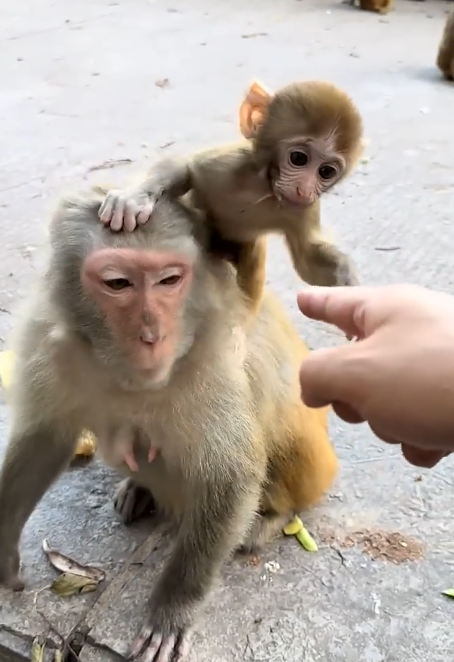
The annual harvest festival was the biggest event of the year. Everyone dressed in their finest, shared food, and danced under lanterns. That year, Miko made the festival unforgettable.
As music filled the air, Miko climbed onto the roof of the village hall. He looked down at the crowd, swayed his tiny body to the beat, and then, out of nowhere, leapt right into the middle of the dancers.
Gasps filled the square — but Miko didn’t steal food or cause chaos. Instead, he copied the dancers. He clapped, he twirled, he even stomped his little feet in rhythm. The children squealed with joy, joining him. The elders, at first stern, soon found themselves laughing uncontrollably.
By the end of the night, Miko had stolen the spotlight. His “dance performance” became the highlight of the festival, retold again and again in the years that followed. From then on, people didn’t just wait for the harvest — they waited for the Funny Monkey’s echo to return with it.
The Market Memories
The village market was another stage for Miko’s comedy. Vendors learned to expect him. Some pretended to scold him, though they always ended up laughing too hard to stay angry.
One morning, a basket of chilies was left unattended. Miko, thinking they were little red berries, popped one in his mouth. The second the spice hit his tongue, he yelped, spun in circles, and dashed to the water jar to gulp down mouthfuls.
The market erupted in laughter. From that day on, whenever anyone in the village ate something too spicy, they joked, “You look just like Miko with the chilies!”
His echo lingered not just in his chatter but in the sayings and jokes that became part of everyday life.
Children’s Companion
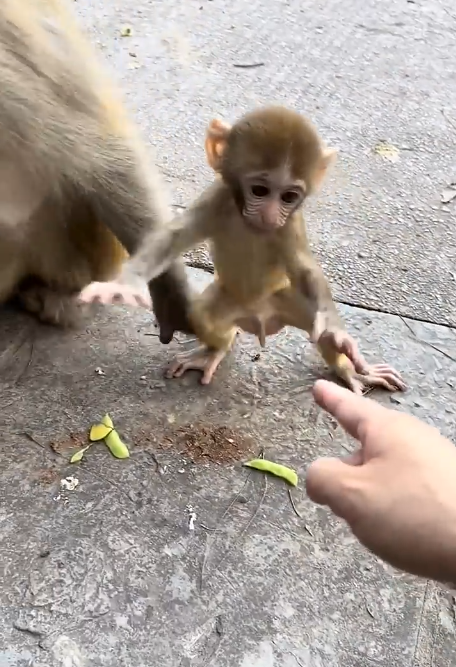
To the children, Miko wasn’t just funny — he was a friend. They invented games with him, chasing him through the fields or letting him “steal” their toys, only to watch him proudly hold them as if he had conquered a kingdom.
He was especially protective of the smallest children. If a toddler wandered too close to a muddy patch, Miko would screech, grab the child’s hand, and pull them back toward safety. Parents began to trust him, calling him the “guardian jester” of the village.
Every laugh he shared with the children echoed louder than any words. For them, childhood was never lonely as long as the Funny Monkey was around.
A Lesson in Laughter
Not all moments were happy in the village. There were times of hardship: poor harvests, heavy rains, and illnesses that spread through homes. But even in those dark times, Miko’s presence carried light.
One evening, after weeks of storms, the villagers gathered with heavy hearts, worried about the ruined crops. Just then, Miko scampered into the square, carrying an oversized umbrella he must have stolen from somewhere. It was too big for him — the handle dragged behind as he staggered around, tripping and squealing dramatically.
The villagers couldn’t help it — they laughed. For a few precious moments, their worries lifted.
It wasn’t that Miko solved their problems, but he reminded them that even in despair, laughter still had a place. His echo wasn’t just funny; it was healing.
The Echo Lives On
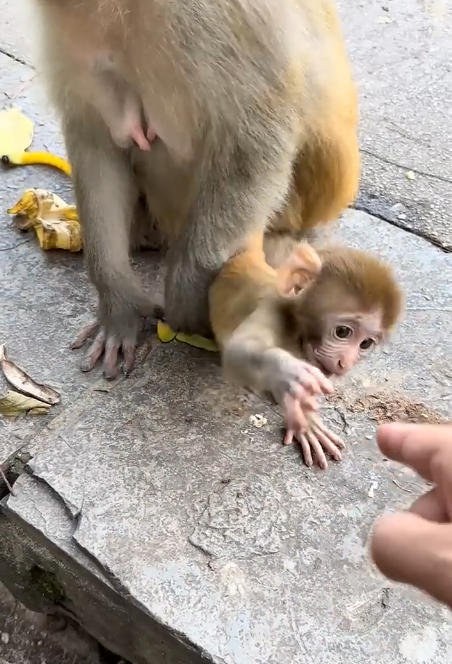
Years passed, and as nature always dictates, Miko grew older. His jumps weren’t as high, and his mischief slowed down. But even as he aged, the villagers still adored him. They carried the memory of his antics into their daily lives.
When children played, they shouted, “Let’s do it like Miko!” before tumbling into the grass. When elders gathered to tell stories, they always included “the time Miko…” followed by fits of laughter.
Even after the Funny Monkey no longer appeared in the square, his echo remained. His laughter lived on in the culture of the village, woven into jokes, traditions, and even lullabies sung to babies.
A New Generation
One morning, years after Miko’s last dance at the festival, a small baby monkey appeared in the village, timid and wide-eyed. The children gasped. Could it be Miko’s child? Or just another wild visitor?
The little monkey climbed onto a barrel and made a funny squeak, almost like a clumsy attempt at Miko’s old call. The children roared with laughter, and the elders nodded knowingly.
“It seems the Funny Monkey’s echo has returned,” one elder said with a smile.
From then on, the new baby monkey was welcomed warmly, as if carrying the torch of Miko’s legacy. Though this one had its own quirks, every giggle it brought reminded the villagers of the legend who came before.
Conclusion
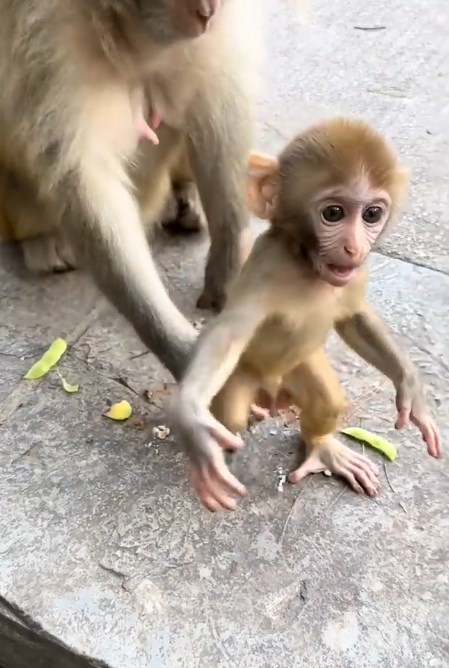
The Funny Monkey continues to echo in the little village, not just in memory, but in the laughter that still fills the air. His silly dances, his mischievous market antics, his unexpected kindness — all live on through the people who loved him.
Every festival, when music begins and lanterns glow, the children still mimic his twirls. Every time someone eats a chili too spicy, they remember his wild dash for water. And every time sadness threatens to overwhelm, the villagers smile and remind each other:
“Remember Miko, the Funny Monkey. His laughter is still here with us.” 🐒😂
And so, in that small village, nestled between hills and forests, the echo of one little monkey’s joy lives forever — not fading, but growing louder with every generation that learns to laugh.
